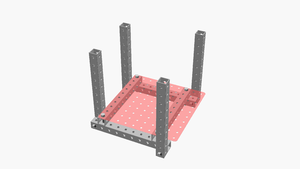Shelf joints: Difference between revisions
From
No edit summary |
No edit summary |
||
| Line 1: | Line 1: | ||
{{Techniques infobox | {{Techniques infobox | ||
|image | |image = Shelf-joint-thumb.png | ||
|designer | |designer = Joy Livingwell | ||
|date | |date = 2000 | ||
|vitamins = | |vitamins = | ||
|materials = | |materials = | ||
|transformations = | |transformations = | ||
|lifecycles = | |lifecycles = | ||
|tools | |tools = [[Wrenches]] | ||
|parts | |parts = [[Frames]], [[Nuts]], [[Bolts]], [[End caps]], [[Plates]] | ||
|techniques | |techniques = [[Tri joints]] | ||
|git | |git = | ||
|stl | |stl = | ||
}} | }} | ||
Revision as of 11:11, 26 May 2021
Technique: Shelf joints
| Tools: | Wrenches |
|---|---|
| Parts: | Frames, Nuts, Bolts, End caps, Plates |
| Techniques: | Tri joints |
Introduction
Using frames and plates of the same dimension to create shelves is awesome.
Challenges
Plates make room for tri-joints challenging to find. Some configurations require cutting notches or holes into plates.
Approaches
Joy Livingwell developed these shelf joints which enable unmodified plates to be used with frames of the same dimension in a sturdy configuration which moves the tri joints to a less obvious location.
-
Shelf supported across width
-
Shelf supported at ends


